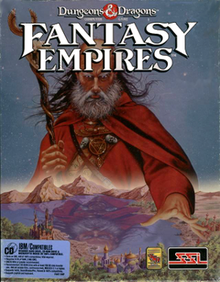Fantasy Empires: Difference between revisions
shouldn't these be up top? |
No edit summary |
||
| Line 19: | Line 19: | ||
}} |
}} |
||
'''''Fantasy Empires''''' is a [[role-playing video game|role-playing]] [[fantasy wargame]] for [[DOS]] made by [[Silicon Knights]] and published by [[Strategic Simulations, Inc.|SSI]] in 1993. |
'''''Fantasy Empires''''' is a [[role-playing video game|role-playing]] [[fantasy wargame]] for [[DOS]] made by [[Silicon Knights]] and published by [[Strategic Simulations, Inc.|SSI]] in 1993. The game uses the ''[[Dungeons & Dragons]]'' license, and is set in the fictional world of [[Mystara]]. |
||
==Gameplay== |
==Gameplay== |
||
Revision as of 21:39, 3 September 2012
This article needs additional citations for verification. (January 2011) |
| Fantasy Empires | |
|---|---|
 | |
| Developer(s) | Silicon Knights |
| Publisher(s) | Strategic Simulations, Inc. |
| Platform(s) | DOS |
| Release | 1993 (floppy disk version); 1994 (CD-ROM version) |
| Genre(s) | Role-playing video game |
| Mode(s) | Single player, Multiplayer |
Fantasy Empires is a role-playing fantasy wargame for DOS made by Silicon Knights and published by SSI in 1993. The game uses the Dungeons & Dragons license, and is set in the fictional world of Mystara.
Gameplay
The player is first tasked with creating a character along iconic Dungeons & Dragons roles. This persona serves as the leader of the army during battles, but does not fight. The main portion of the game is played on the 'strategic map'. In this portion of the game, the main tasks include expanding territory by invading and conquering provinces either neutral or enemy owned, constructing building improvements on provinces already owned, and hiring troops. Troops can only be hired if the appropriate buildings are constructed.
Apart from humans, the game also has provinces where orcs, dwarves, elves, halflings, and shadow elves can all be built as units in the army.
The game comes with a full view or fog of war option. The full view allows the entire world to be seen, while the fog of war only allows knowledge of adjacent kingdoms.
A notable feature of the game is its AI, which used a neural net.
Some features of the game are making truces (the breaking of which could cause lawful or neutral characters to become chaotic), creating different types of heroes (fighter, dwarven, elf, magic user, cleric), setting the battle scale (from 20:1 to 1:1) and casting magic spells based upon the points derived from heroes (magic user, clerical, and druidic).
Multiple battles with the same troops against 50 or more opponents could cause them to become veterans or even elites in rank.
The game comes with a number of NPC opponents, some of whom go all the way through the 36th level and present a formidable challenge.
While the game is somewhat dated and was originally programmed to run using MS-DOS 5.0 (1993 floppy disk version) or MS-DOS 6.0 (1994 CD-ROM version) it can run on newer operating systems as well using for example DOSBOX.
Reception
This section needs expansion. You can help by adding to it. (January 2011) |
The game was reviewed in 1994 in Dragon #207 by Sandy Petersen in the "Eye of the Monitor" column. Petersen gave the game 3 out of 5 stars.[1]
Review in the German computergaming magazine POWERPLAY 12/1993 rated 61% (of 100%) for the original 1993 floppy disk version.
CD-ROM Version Differences
The 'true' CD-ROM version doubled the digitized voice samples available for the Dungeon Master, and had an animated/spoken introduction sequence. Players could additionally also select their shield marker designs. Three new terrain types (Broken Lands/Black Sands/Swamp) were added to the game; along with three strategy spells (Dispel Evil/Obscure/Timestop) and six battle spells (Disintegrate/Transmute Flesh to Stone/Resist Fire/Striking/Metal to Wood/Warp Wood).
References
- ^ Petersen, Sandy (July 1994). "Eye of the Monitor". Dragon (207): 59–62.
External links
- Fantasy Empires at MobyGames
- http://www.dosbox.com/comp_list.php?showID=785&letter=F
- http://www.gamefaqs.com/pc/564693-fantasy-empires
- Intro Movie and samples of spell effects
- Silicon Knights - the website of the producers of Fantasy Empires
- http://www.squakenet.com/computer_games/1058/Fantasy-Empires/download.html
